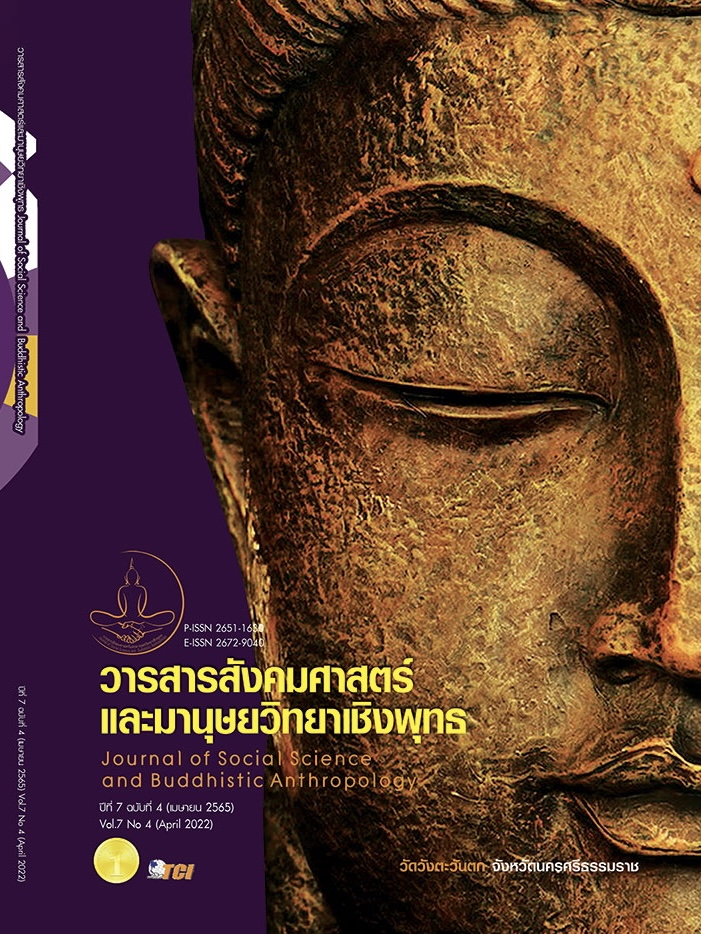CONTESTING POWER PROCESS AND ETHICAL THEMES IN BAD GENIUS LITERATURE
Keywords:
Contesting Power Process, Buddhist Ethical Themes, Bad Genius LiteratureAbstract
The objectives of this research article were to analyze contesting power process of characters and Buddhist ethical themes in Bad Genius novel of Ror Ruea Nai Mahasamut. Pierre Bourdieu’s theories and Buddhist ethical themes are applied as framework in this research. This study is a qualitative research relying on descriptive-analytical approach. The results showed the cause of the contesting power is social inequality, resulting from inequality in capital ownership, class differences, and the shaping of family habitus. The results showed that 1) inequality, privilege, and corruption are all problems caused by capital. 2) Inequality is exacerbated by class. 3) Fields are places where characters demonstrate their value, negotiation, and struggle for dominance. 4) Habitus has discovered two characteristics: a constant habitus and a shifting habitus. 5) Five strategies for competing for power were found: conservation, inheritance, rejection, negotiation, and overthrow. 6) Tuition payments, special education, scholarships, and grading scales are all examples of symbolic violence in education. From the study ethical themes, it was discovered that themes in the literature are related to five Buddhist principles: Ajjava, Panna, Kleshas Vatta, Kamma, and Yoniso Manasikara. The author proposed the idea there were two factors contributing to the corrupt. The first factor was lackng of good Paratoghosa, which was an external factor. The second factor was lacking of Yoniso Manasikara, which was an internal factor. By the reason of such factors, which led the characters to aim things with highly wanted. They emerged as the Kleshas Vatta that nurtured Akusalakamma, which caused suffering. As a consequence, the relief of suffering should begin with the rectification of Mano-Kamma by using Yoniso Manasikara as a factor to drive for Sammadinnhi. These lead to the results in an awareness of not doing evil and an eagerness to do good.
References
กานต์ธิตา ขยันการนาวี. (2558). กานต์ธิตา ขยันการนาวีประเทศสแกนดิเนเวีย. ใน วิทยานิพนธ์อักษรศาสตรมหาบัณฑิต สาขาวิชาวรรณคดีเปรียบเทียบ. จุฬาลงกรณ์มหาวิทยาลัย.
เก้า มีนานนท์. (2560). ปักหมุดการเดินทางระดับนานาชาติของ ‘ฉลาดเกมส์โกง’ หลังความสำเร็จในไทย. เรียกใช้เมื่อ 5 กันยายน 2564 จาก https://thestandard.co/ badgenius-gointer
ชนิดา เสงี่ยมไพศาลสุข. (2550). มโนทัศน์สำคัญ ๆ ทางสังคมวิทยา-มานุษยวิทยาในผลงานของปิแยร์ บูร์ดิเยอ. ใน นพพร ประชากุล (บรรณาธิการ). เศรษฐกิจของทรัพย์สินเชิงสัญลักษณ์ (หน้า หน้า 47-115). กรุงเทพมหานคร: คบไฟ.
เดลินิวส์. (2561). “ฉลาดเกมส์โกง” กวาด 12 รางวัล “สุพรรณหงส์ ครั้งที่ 27”. เรียกใช้เมื่อ 5 กันยายน 2564 จาก https://www.dailynews.co.th/entertainment/631835
ธีวรา ชวภัควิทยา. (2547). การศึกษาวิเคราะห์แนวคิดเชิงจริยธรรมที่ปรากฏอยู่ในหนังสือกฎหมายตราสามดวง. ใน วิทยานิพนธ์ศิลปศาสตรมหาบัณฑิต สาขาวิชาจริยศาสตร์ศึกษา. มหาวิทยาลัยมหิดล.
ปิแยร์ บูร์ดิเยอ. (2550). เศรษฐกิจของทรัพย์สินเชิงสัญลักษณ์. กรุงเทพมหานคร: คบไฟ.
พรรณนพ สิกกะ. (2541). วิเคราะห์กลวิธีการเขียนและแนวคิดด้านจริยธรรมในนวนิยายของ วาวแพร. ใน วิทยานิพนธ์ปริญญาการศึกษามหาบัณฑิต สาขาวิชาภาษาไทย. มหาวิทยาลัยทักษิณ.
พระครูอภิรักษ์ชัยมงคล (พระมหาตุ๊ กิตฺติวณฺโณ/วงษ์มณี). (2548). การศึกษาผญาเชิงจริยธรรมที่พระสงฆ์ชาวอีสานนำไปใช้สอน. ใน วิทยานิพนธ์พุทธ
ศาสตรมหาบัณฑิต สาขาวิชาพระพุทธศาสนา. จุฬาลงกรณ์มหาวิทยาลัย.
พระพรหมคุณาภรณ์ (ป.อ. ปยุตฺโต). (2549). พุทธธรรม ฉบับปรับปรุงและขยายความ. (พิมพ์ครั้งที่ 11). กรุงเทพมหานคร: สหธรรมิก.
ภาณุมาศ อิสริยศไกร. (2556). เกมคือโลก โลกคือเกม: การช่วงชิงอำนาจในวรรณกรรมเยาวชนร่วมสมัยแนวดิสโทเปีย. ใน วิทยานิพนธ์อักษรศาสตรมหาบัณฑิต สาขาวิชาวรรณคดีเปรียบเทียบ. จุฬาลงกรณ์มหาวิทยาลัย.
ร. เรือในมหาสมุท. (2561). Bad Genius ฉลาดเกมส์โกง. กรุงเทพมหานคร: แจ่มใส พับลิชชิ่ง.
วรานันท์ วรวัฒนานนท์. (2558). ผู้หญิงภายใต้ระบบทุนนิยมในอาชญนิยายญี่ปุ่นร่วมสมัย. ใน วิทยานิพนธ์อักษรศาสตรมหาบัณฑิต สาขาวิชาวรรณคดีเปรียบเทียบ. จุฬาลงกรณ์มหาวิทยาลัย.
วัดบวรนิเวศวิหาร. (2544). ทศบารมี ทศพิธราชธรรม. (พิมพ์ครั้งที่ 3). กรุงเทพมหานคร: มหามงกุฎราชวิทยาลัย.
วิทย์ วิศทเวทย์. (2553). ปรัชญาทรรศน์: พุทธปรัชญา. กรุงเทพมหานคร: โครงการเผยแพร่ผลงานวิชาการ คณะอักษรศาสตร์จุฬาลงกรณ์มหาวิทยาลัย.
วินัย บุญลือ. (2545). ทุนทางวัฒนธรรมและการช่วงชิงอำนาจเชิงสัญลักษณ์ของชุมชน ชาวปกาเกอะญอ. ใน วิทยานิพนธ์ศิลปศาสตรมหาบัณฑิต สาขาวิชาการพัฒนาสังคม. มหาวิทยาลัยเชียงใหม่.
สุนีย์ ประสงค์บัณฑิต. (2553). แนวความคิดฮาบิทัสของปิแอร์ บูร์ดิเยอ กับทฤษฎีทางมานุษยวิทยา. กรุงเทพมหานคร: ศูนย์มานุษยวิทยาสิรินธร (องค์กรมหาชน).
แอนนิต้า หว่อง. (2560). ย้อนมองหนังไทยในปี 2017 ปีแห่ง Young Blood, สารคดี และหนังภูมิภาค. เรียกใช้เมื่อ 25 กรกฎาคม 2561 จาก https://gmlive.com/thai-film-2017-trend
Berry, C. (2018). New achievements, new challenges: The 20th far east film. Retrieved September 5, 2021, from https://www.sensesofcinema.com/ 2018/festival-reports/new-achievements-new-challenges-the-20th-far-east-film-festival/
Griffith, K. (1994). Narrative fiction: An introduction and anthology. Fort Worth: Harcourt Brace.
Jediyuth. (2560). ฉลาดเกมส์โกง (Bad Genius) ได้รับเลือกให้เป็นหนังเปิด New York Asian Film Festival. Retrieved กันยายน 5 , 2564 , from https://jediyuth.com /2017/05/22/bad-genius-opens-nyaff-2017/
Downloads
Published
How to Cite
Issue
Section
License
Copyright (c) 2022 Journal of Social Science and Buddhistic Anthropology

This work is licensed under a Creative Commons Attribution-NonCommercial-NoDerivatives 4.0 International License.









